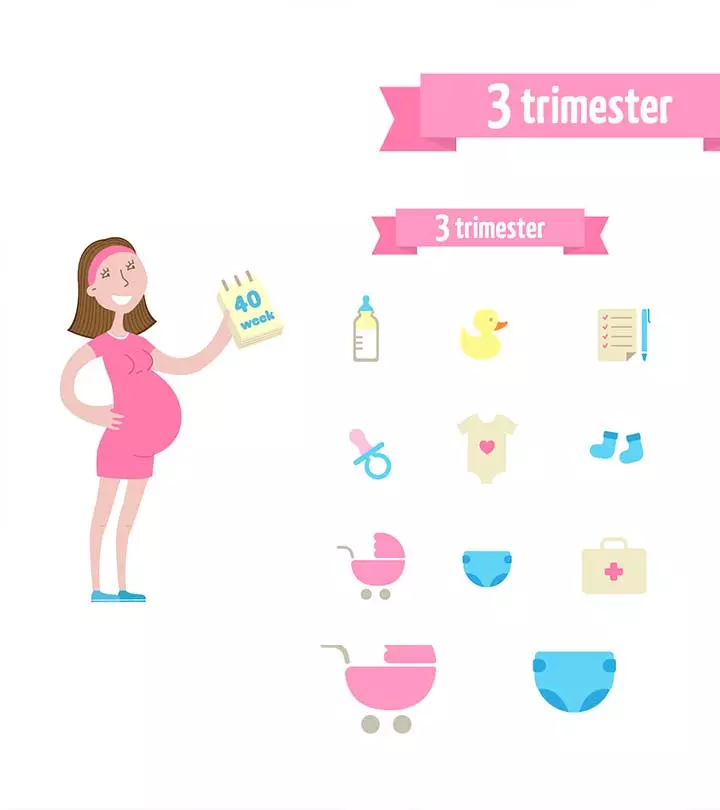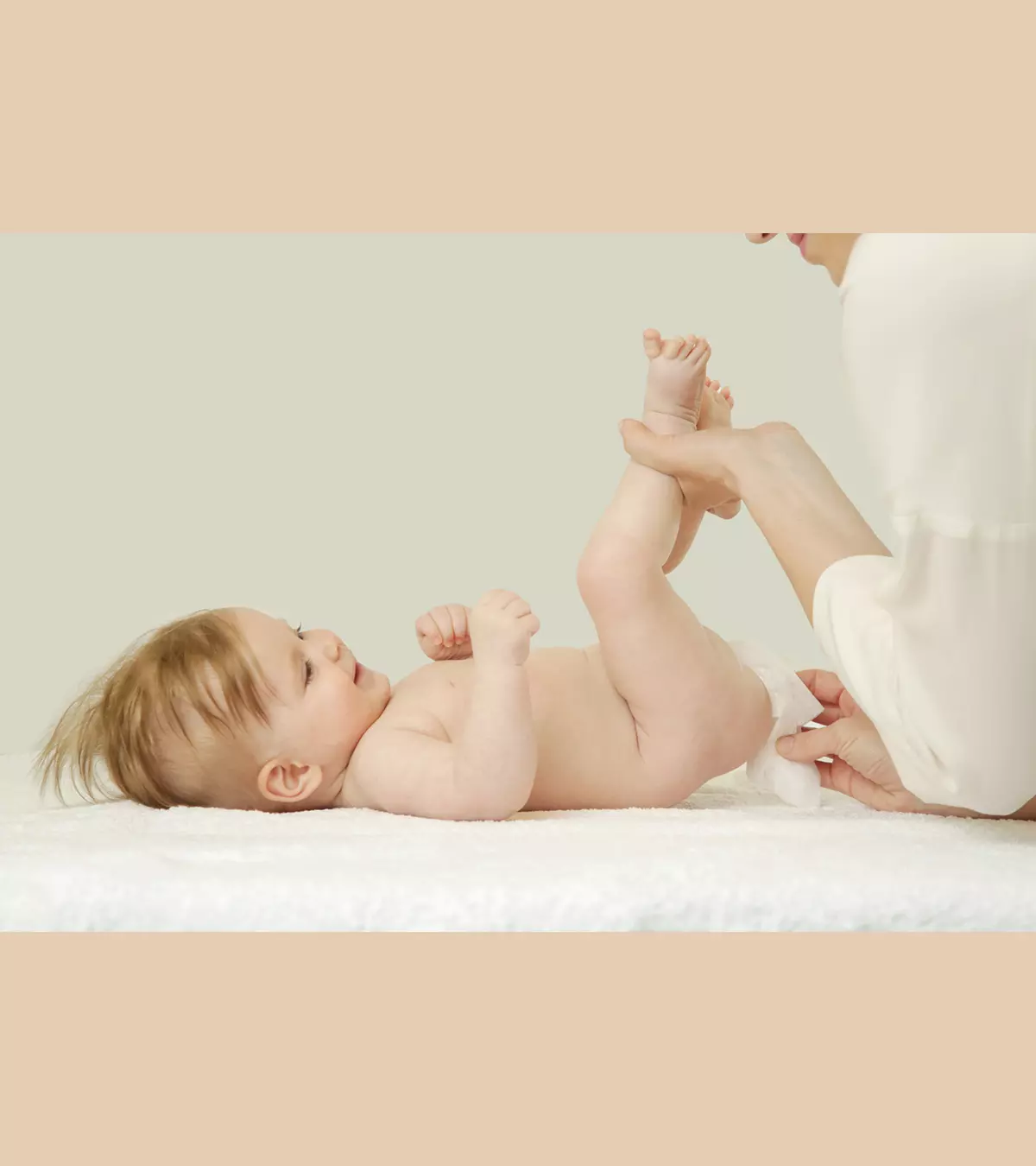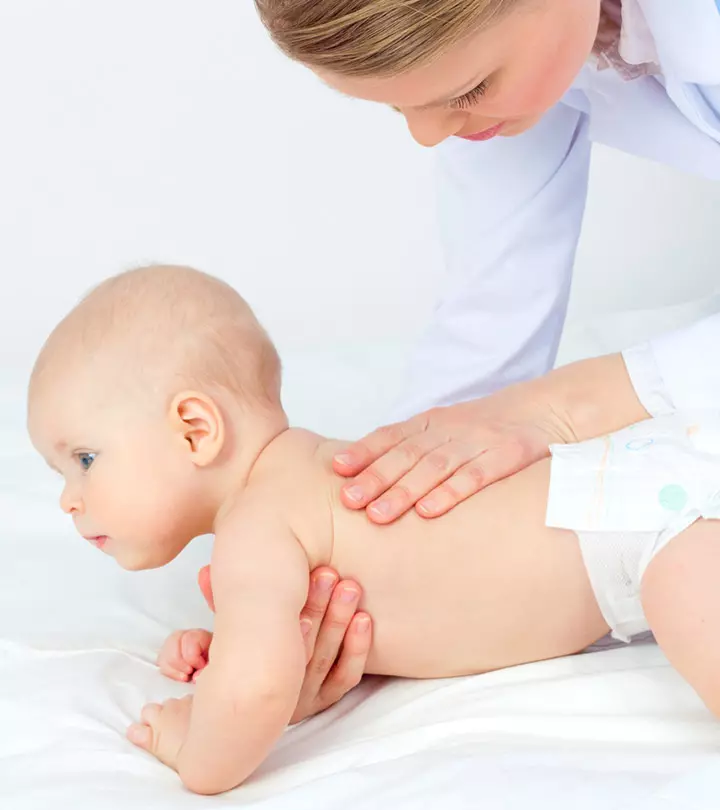
Image: Shutterstock
The third trimester that begins in the 28th week of pregnancy is also the last. It mostly ends around the 40th week, after the baby is born (1). During these last three months, the body undergoes several physical and physiological changes. This stage prepares the mother and the fetus for the delivery and what comes after.
During the last trimester, a few women experience discomforts such as insomnia, antenatal anxiety, and backache (2). Read on to know more about this trimester, the changes you and your baby would undergo, and for a few tips to help you prepare for your labor.
Key Pointers
- During the third trimester, there is rapid growth and development of a fetus, and the kidneys, lungs, and brain continue maturing.
- As your body prepares for childbirth in the third trimester, you may experience extreme physical and physiological changes, like leaky breasts, false contractions, etc.
- Excessive nausea and vomiting, decreased fetal movements, severe abdominal cramps, etc., may indicate an abnormality in the third trimester.
- Blood-tinged mucus plugs and labor contractions with increasing frequency, duration, and intensity are signs of true labor contractions.
Changes A Fetus Undergoes During The Third Trimester

The third trimester comprises the seventh to the ninth month of pregnancy. The fetus develops and grows rapidly during this period, and its kidneys, lungs, and brain continue maturing (3) (4).
- By the 32nd week, the fetus’ cartilages begin to harden, but they are still soft. It’s because they have just started storing minerals, such as calcium and iron. Then, they can hear, sense changes in the light, taste amniotic fluid, grasp, stretch, and listen to sounds. Additionally, they begin appearing plump due to continued fat gain.
- By the 36th week, the fetus can get in the head-down position in the womb and may drop in the pelvic area (lightening) to prepare for labor. If the baby is in the bottom-down or breech position, your doctor and midwife will discuss with you about the labor and the possibility of cesarean delivery (Cesarean-section) (2).
- By 38th to 40th week, the baby will shed vernix (creamy, white coating on the skin that protects the fetus’ skin) and lanugo (fine, soft hair on the body). Also, their lungs, brain, kidneys, and musculoskeletal system are mature enough to function independently. Now, your baby will measure about 19 to 21 inches long and weigh six to nine pounds, on average.
Babies born around the 37th week of gestation are considered full-term. For a pregnancy that continues beyond the 40th week, the doctor is likely to induce labor.
 Quick fact
Quick factChanges A Woman Is Likely To Have During The Third Trimester
An expecting mother undergoes turbulent physical and physiological changes in the third trimester. These changes are a sign that the baby is growing and your body is preparing for childbirth.
Here’s a brief overview of some changes you will experience during the last trimester of your pregnancy (1) (5).
- Weight gain and shortness of breath: Expecting mothers gain around 0.5 to a pound of weight per week in the last trimester. This weight gain is due to several factors, including the rapid growth of the baby. As the baby grows, your tummy expands and pushes against the diaphragm, causing shortness of breath.
- Puffiness: As the pregnancy progresses, you may experience puffiness or swelling in the face, hands, legs, ankle, and feet. It happens due to reduced blood flow and fluid retention. This swelling may put pressure on the nerves and may also cause you to feel tingling and numbness.
- Leaky breasts and stretch marks: At the beginning of the third trimester, you will feel your baby moving a lot, which will gradually reduce as the space inside the womb lessens. Then, your breast will grow in size and start leaking some milk, and stretch marks will appear due to an increase in your belly size, which expands to accommodate your baby.
- Abdominal pain and backaches: With an increase in your weight, belly size, and the pregnancy hormones that relax the connective tissue, especially in the pelvic area, you experience abdominal, back, pelvic, and hip aches. These aches make sitting and sleeping difficult for many women, causing additional issues, such as insomnia.

- Heartburn: As your belly grows, your stomach is pushed upwards to make space for the expanding uterus. Also, the pregnancy hormones relax the valve between the stomach and esophagus. Both these changes make the stomach acid reflux into the esophagus, causing indigestion and heartburn.
- Frequent urination: As the baby grows in size and the uterus sinks deeper into the pelvis, mothers experience growing pressure on their urinary bladder, causing frequent urination. Besides frequent urination, urine leakage, especially while coughing, sneezing, bending, and laughing, is another problem that mothers face due to stretched pelvic floor muscles.
- Spider veins and varicose veins: An increase in blood volume and growing weight puts extra pressure on the blood vessels in the body. It causes the small blood vessels to swell, exposing a pregnant woman to the risk of developing tiny red-purplish veins (spider veins) on her face, neck, and arms. On the other hand, when the large vessels swell and twist due to growing pressure on the legs, they cause varicose veins. Experts advise regular exercise and elevation of the legs while sitting to ease swelling.
- Constipation and hemorrhoids: The pregnancy hormones relax the intestinal muscles and slow down the passage of food in the large intestine, causing constipation in several women. Chronic constipation coupled with the pressure of the expanding uterus and an increase in blood volume put undue strain on the veins of the anus or rectum, leading to hemorrhoids (6).
- Braxton Hicks contractions: These are false contractions caused due to the tightening of the uterine muscles. You may begin feeling them as early as 16 weeks. However, they will become stronger and occur more often during the third trimester, especially when nearing labor (7).
- Vivid dreams and clumsiness: Women nearing the end of pregnancy may get vivid dreams related to childbirth. It happens due to a surge in pregnancy hormones and is normal. Clumsiness is another issue that women may experience due to an overdrive of pregnancy hormones, forgetfulness, and shortness of breath due to your tummy growing in size.
All these changes occurring in the same period may make you anxious (antenatal anxiety) and overwhelmed. Physical discomfort can contribute to irritability and amplify emotional fluctuations (2). But, the good news is that most of these issues will resolve as soon as you deliver the baby.
 Quick fact
Quick factSigns There’s Something Wrong
Feeling some discomfort and pain in the abdomen or legs in the last trimester is common. But, some peculiar signs may indicate there’s something wrong, and you need to see your healthcare provider right away. These signs are:
- Severe abdominal cramps and pain
- Profuse nausea and vomiting
- Headaches, blurred vision, stomach pain
- Vaginal or rectal bleeding
- Leakage of clear fluid from the vagina
- Reduced fetal movements
- Extreme fatigue and dizziness
- Burning sensation or pain during urination
 Caution
Caution
Tips To Stay Healthy During The Third Trimester
An increase in weight and growing tummy size brings some lifestyle changes that may affect your and your unborn baby’s health. Here are some dos and don’ts to ensure you and your baby stay healthy while approaching childbirth.
Dos
- Track your weight gain and talk to your doctor if you aren’t gaining weight or gaining too much weight than what’s recommended for you.
- Keep your total calorie intake within the suggested limits to gain healthy weight.
- Learn about the nutritional requirements in the third trimester and eat a well-balanced diet containing high-fiber, low-fat, and high-protein foods, such as lean meat, pulses, whole grains, fruits, and vegetables.

- Make healthy snack choices, such as unsweetened yogurt with crackers if you crave sweets or get hunger pangs.
- Stay hydrated and drink plenty of water. You can also consume other fresh, unsweetened beverages, such as coconut water, soup, and lemon water.
- Stay active and walk as much as possible unless directed otherwise by your obstetrician or midwife.
- Do exercises, such as Kegel’s, to strengthen your pelvic area to support childbirth.
- Take your prenatal vitamins as prescribed.
- Maintain good dental hygiene and visit your dentist regularly.
- Take adequate rest, try sleeping well, and indulge in activities that keep birth-related anxiety and stress away.
- Practicing mindfulness exercises, deep breathing, or relaxation techniques like prenatal yoga can help you stay calm and centered.
Besides these, go to your scheduled prenatal care visits regularly. The doctor will monitor your and your baby’s health during those visits and check your glucose and hemoglobin level, as well as perform routine ultrasound to check the fetal development and growth. They will also test you for vaginal group B streptococcus (GBS) colonization. If you test positive, the doctor will put you on antibiotics when your waters break to treat the GBS. Then, in the ninth month, they will examine your cervix for the signs of effacement and dilation.
Don’ts
- Avoid consuming high-fat, high-sugar, high-sodium, processed foods that can cause weight gain and water retention issues in pregnancy.
- Abstain from consuming high-mercury fish, raw or smoked seafood, unpasteurized foods, and raw sprouts.
- Limit or avoid consumption of caffeinated beverages and alcohol.
- Don’t smoke or use illegal drugs as it increases the risk of miscarriage or stillbirth.
- Avoid high-intensity, strenuous exercises or strength training activities during the perinatal period.
- Take prescription drugs under medical guidance only.
- Avoid long car and airplane travel from the 32nd week of your pregnancy. It’s a vital precaution for those carrying multiples and with health issues, as there is a risk of going into premature birth and deep vein thrombosis (8).
Tips To Stay Prepared For Delivery
Childbirth can become smoother for you and those supporting you if you stay prepared with some essentials. Here’s a list you can keep handy while you prepare for the “D-day.”
- Enroll in a prenatal class (if you haven’t already) to meet other pregnant women. It will help you share your maternal health experiences and relieve some antenatal anxieties. Also, these classes help you resolve your doubts about labor and its stages.
- Talk to your doctor or doula and discuss where you want to give birth (home/hospital), how you want your delivery (e.g. water birth or vaginal birth), and how you would want to manage your pain during labor (epidural or any other pain-relieving medication).
- Inform your doctor if you have opted for cord banking. The doctor must know about it so that they can store your umbilical cord properly immediately after delivery. If you have opted for a private cord banking option, don’t forget to pack your cord banking kit in your hospital bag.
- Read about neonatal baby care and breastfeeding. It will help you know the baby cues and baby care techniques, such as burping after feeding, making your breastfeeding journey relatively smooth.
- Shop for baby essentials, such as diapers, wipes, and clothing, and pack them in the maternity bag. You can also make a checklist of items, such as an iPod and books that you want to carry with you to the hospital.

- Buy essential gear, such as a stroller, crib, and car seat, as you need them as soon as you are out of the hospital. If you are using hand-down items, ensure their features sync with the current safety standards.
- Set up your baby’s nursery. Right from selecting the wall colors to where you want to keep the crib, these are some tasks to keep you occupied during the last trimester.
- Keep emergency numbers written down in your diary or save them on your or your family member’s phones.
- Stock pre-prepared, frozen meals in your refrigerator. It will be helpful for the first few days after childbirth when you and other caregivers are engrossed in looking after the newborn, and the mother is in the postpartum recovery.
With all of this, celebrate your baby bump by arranging a baby shower party for family and friends. At that party, you can have a personalized photoshoot and hang the pictures in your baby’s room to cherish those moments lifelong.
Signs Indicating You Are In Labor
As you near the end of pregnancy, here are some signs of real labor you should watch.
- Blood-tinged mucus plug
Vaginal discharge in the last trimester may increase. However, if you see a dark brown or pink-colored discharge with blood, go to your doctor right away. This is known as “show”, and it’s a sign of early labor.
Note: If you notice spotting in the last trimester, visit a doctor immediately. Spotting may indicate an underlying problem, such as placenta previa (a condition where the placenta covers the cervix), placental abruption (separation of the placenta from the uterine wall), or preterm labor.
- Labor contractions
Unlike Braxton Hicks contractions, real labor contractions increase in frequency, intensity and duration. Hence, if you feel your contractions are increasing in frequency, duration and intensity, go to your doctor right away. Besides these, if your water breaks, you must visit your doctor immediately.
Frequently Asked Questions
1. Is banana safe in the third trimester?
Yes, banana is a nutritious fruit recommended for consumption throughout pregnancy and can thus be safely consumed in the third trimester (9).
2. Is folic acid necessary in the third trimester?
Folic acid supplements are mandatory until the 12th week of pregnancy, after which you may not require them. Hence, it is unnecessary in the third trimester unless your doctor prescribes it, depending on your health (10) (11).
3. Is it normal to be really tired in the third trimester?
Yes, it is normal for women to be more tired in the first and third trimesters due to hormonal changes and the growing uterus, respectively (12).
The third trimester of pregnancy begins when you are 28 weeks pregnant, and it is when you and your baby prepare for the big day. Breathlessness, leaky breasts, Braxton Hicks contractions, vivid dreams, and other physical and physiological changes will likely exhaust you mentally and physically. These difficulties, however, will be worth it when you finally get to carry your baby in your arms. Further, being aware of these changes and taking the necessary steps to stay prepared might facilitate a smoother gestation. Also, be on the lookout for any danger indications or labor symptoms during this phase.
Infographic: Pregnancy Guide To Stay Safe In The Third Trimester
As you enter the third trimester of pregnancy, it’s crucial to prioritize your safety and well-being. The infographic below offers essential tips and advice to help you navigate this final stage of pregnancy before you welcome your little angel to the world.

Illustration: Momjunction Design Team
Illustration: Third Trimester: When It Starts And What Changes Happen

Image: Dall·E/MomJunction Design Team
References
- Third Trimester of Pregnancy: Fetal Development
https://americanpregnancy.org/healthy-pregnancy/pregnancy-health-wellness/third-trimester/ - Third trimester
https://www.pregnancybirthbaby.org.au/third-trimester - Your Baby’s Development: The Third Trimester
https://familydoctor.org/your-babys-development-the-third-trimester/ - Stages of pregnancy
https://womenshealth.gov/pregnancy/youre-pregnant-now-what/stages-pregnancy - Changes in Your Body During Pregnancy: Third Trimester
https://familydoctor.org/changes-in-your-body-during-pregnancy-third-trimester/ - How Do You Treat Pregnancy Hemorrhoids and Constipation?
https://www.hopkinsmedicine.org/all-childrens-hospital/patient-families - Braxton Hicks contractions
https://www.pregnancybirthbaby.org.au/braxton-hicks-contractions - Travel During Pregnancy
https://americanpregnancy.org/healthy-pregnancy/is-it-safe/travel-during-pregnancy/ - Healthy eating for pregnancy and lactation
https://mckinley.illinois.edu/sites/default/files/docs/pregnancylactation.pdf - Vitamins, supplements, and nutrition in pregnancy
https://www.nhs.uk/pregnancy/keeping-well/vitamins-supplements-and-nutrition/#:~:text=It’s%20important%20to%20take%20a,tube%20defects%2C%20including%20spina%20bifida - Is 12 weeks too late to take folic acid
https://www.tommys.org/pregnancy-information/im-pregnant/nutrition-in-pregnancy/folic-acid-pregnancy - Fatigue during pregnancy
https://americanpregnancy.org/healthy-pregnancy/pregnancy-concerns/fatigue-during-pregnancy/ - The Third Trimester
https://www.hopkinsmedicine.org/health/wellness-and-prevention/the-third-trimester#:~:text=During%20the%20third%20trimester%2C%20your,average%2C%206%20to%209%20pounds - Your third trimester guide
https://www.unicef.org/parenting/pregnancy-milestones/third-trimester#look-out
Community Experiences
Join the conversation and become a part of our nurturing community! Share your stories, experiences, and insights to connect with fellow parents.
Read full bio of Dr. Ng Kai Lyn
Read full bio of Swati Patwal
Read full bio of Rebecca Malachi
Read full bio of Aneesha Amonz

















